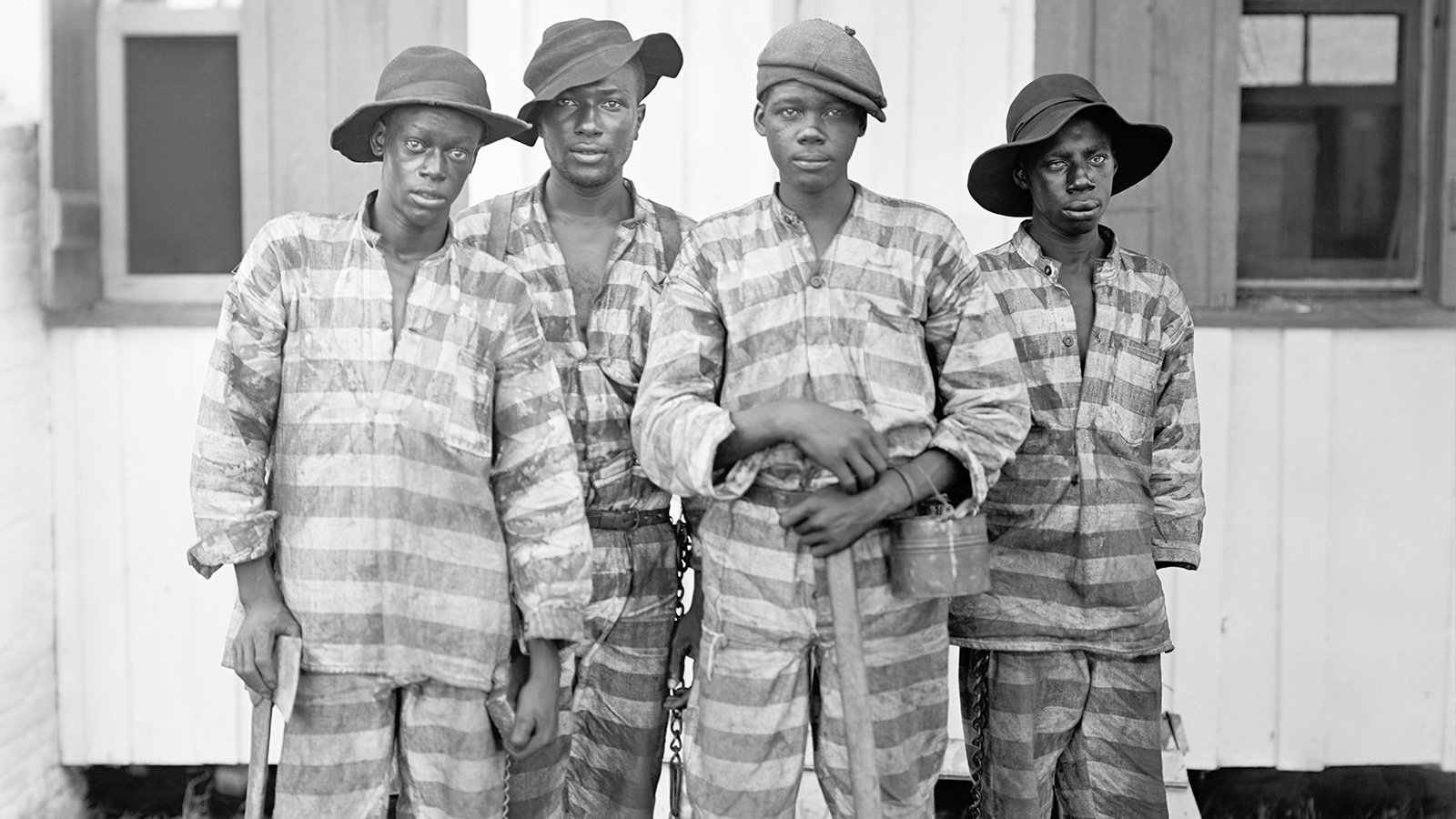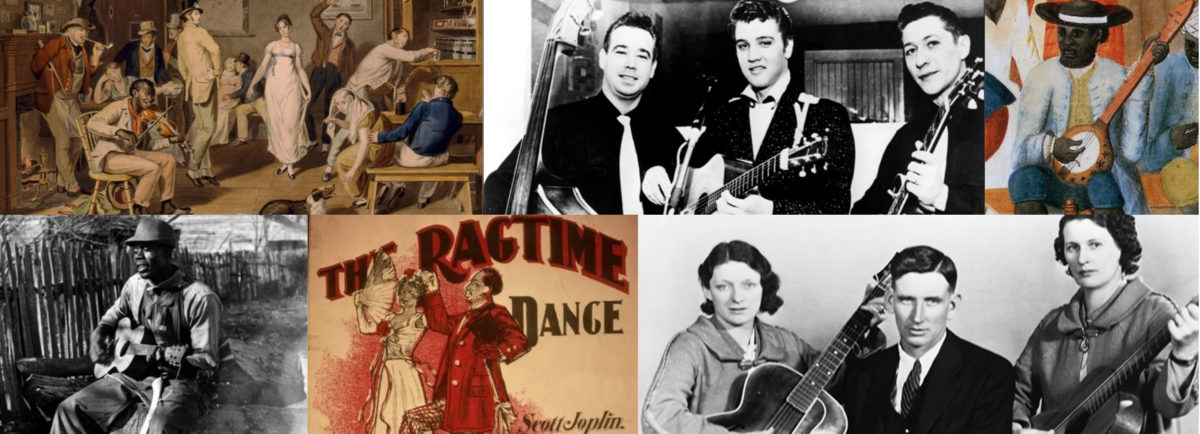
Overview
"Worried Man Blues" is an American folk song that folklorists generally believe originated with African American singers. The lyrics describe the experiences of someone who is arrested for unspecified reasons and sentenced to work on a chain gang. The Carter Family, who made the first recording of the song in 1930, learned it orally from an unidentified informant. In the decades before the Carter Family's recording, Black blues singers had sung and recorded key lyrics, including "I'm worried now, but I won't be worried long," in various other songs. The melody is similar to, and may be derived from, the nineteenth-century African American spiritual “Do Lord, Remember Me.”
Historical Background
The rebuilding of the South following the Civil War was a highly contentious and divisive time. Despite new constitutional guarantees of citizenship and voting rights, many White Southerners were unwilling to accept African Americans as their equals. As a result, African Americans suffered extreme prejudice and were subject to discriminatory laws, violence, and murder. Black Codes passed by southern state governments reinforced the ideology of white supremacy and kept African Americans in subservient positions by restricting their rights to vote, move, get better jobs, mix with White people, and be treated as citizens.
During this time, African Americans could be arrested and imprisoned for the crime of "vagrancy," which meant being unemployed. Under the convict leasing system, prisoners were leased to the owners of factories, farms, mines, and railroads to meet the South's demand for cheap labor after the abolition of slavery. These prisoner laborers, primarily African American men, sometimes lived out their lives without trial or connection to their families. The convict leasing system peaked around 1880. It was outlawed over time, state by state, and finally abolished by President Franklin D. Roosevelt in 1941.
While the song "Worried Man Blues" does not specify the reason for the narrator's incarceration, the opening stanza suggests that this prison laborer may be guilty only of the crime of vagrancy.
I went across the river, I lay down to sleep
I went across the river, I lay down to sleep
When I woke up, had shackles on my feet
Song History
Key phrases from “Worried Man Blues” appear in folk and blues songs that may predate it. Such floating lyrics or maverick stanzas were typical in the late nineteenth and early twentieth centuries. Following emancipation, Black musicians, or songsters, traveled from town to town on foot, horseback, or train, trying to eke out a living. Their musical repertoire included spirituals, field hollers, British ballads, blues ballads, minstrel songs – anything that might appeal to the listeners before them at any given moment. Often singers improvised songs with guitar accompaniment, singing whatever words came to mind, including fragments of other songs they had heard or sung before.
The earliest documented lyrics that later appeared in "Worried Man Blues" occur in "The Railroad Blues." Historian Walter Prescott Webb collected the words, without a tune, from African American musician Floyd Canada in or near Beeville, Texas. The Journal of American Folklore published the song in their July-September, 1915 issue. "The Railroad Blues" contains eighty four-line stanzas with little narrative unity. The general subject matter is that of wandering the country on the railroads. The following lines from the song, or variations, would later appear in "Worried Man Blues."
It takes a worried woman to sing a worry song
I'm worried now, but I won't be worried long
The train I ride is sixteen coaches long
You may know I've caught a train and gone
The song "Hawkie is a Schemin' Bird," published in writer and folklorist Dorothy Scarborough's 1925 book On the Trail of Negro Folk-Songs, references a train "sixteen coaches long." Scarborough collected the song from Wirt Williams in Mississippi. Likewise, Texas blues musician Blind Lemon Jefferson sings "The train I ride, eighteen coaches long" in his 1927 recording of "Right of Way Blues."
Blind Lemon Jefferson: "Right of Way Blues" (1927)
The tag line of the "Worried Man Blues" chorus, "I'm worried now, but I won't be worried long," was common in blues records of the 1920s. Ida Cox sang it on her "Southern Woman's Blues” record, released in 1925. Blind Blake sang similar words in "Blakes’s Worried Blues” (1926), as did John D. Fox in “The Worried Man Blues” (1927), the Memphis Jug Band in “State of Tennessee Blues” (1927), Ishman Bracey in “Saturday Blues” (1928), and Charley Patton in numerous songs, including “Green River Blues” (1929) and “Down the Dirt Road Blues” (1929).
None of these songs feature the “Worried Man Blues” melody or harmonic structure despite shared lyrics and similar titles. Folklorist William E. Lightfoot observes that the “Worried Man Blues” melody may be derived from the African American spiritual “Do Lord, Remember Me.”
Mississippi John Hurt: "Do Lord Remember Me" (1963)
“Do Lord, Remember Me” follows a 16-bar form with stanzas of four lines each:
Do Lord, do Lord, do remember me
Do Lord, do Lord, do remember me
Do Lord, do Lord, do remember me
Do Lord, remember me
The earliest recordings of “Worried Man Blues” are in a 12-bar form, eliminating the third line of each “Do Lord, Remember Me” stanza. Many later versions feature 16-bar, four-line stanzas, though some still perform the song with 12-bars.
The Carter Family recorded the first known version of “Worried Man Blues” in 1930. The Carters were a trio of White singers and musicians from Maces Springs in Southwest Virginia. Between 1927 and 1941, the original Carter Family recorded 292 songs for the Victor and Decca record companies. Alvin Pleasant Carter, sometimes aided by African American guitarist Lesley Riddle, collected many of these songs from White and Black singers throughout the mountains of Virginia, Kentucky, and Tennessee. According to musicologist Charles K. Wolfe, who researched the Carter Family extensively, they learned “Worried Man Blues” from one such informant, but they couldn’t remember who.
The Carter Family: "Worried Man Blues" (1930)
Many folk, bluegrass, country, and popular music artists have since performed or recorded the song, including J.E. Mainer’s Mountaineers, New Lost City Ramblers, Pete Seeger, Woody Guthrie, Cisco Houston, Ramblin’ Jack Elliot, Lonnie Donegan, Flatt and Scruggs, June and Johnny Cash, the Kingston Trio, Van Morrison, and Devo. The following version by Burl Ives shows the song in its 16-bar form.
Burl Ives: "Worried Man Blues" (1949)
Lyrics
chorus:
It takes a worried man to sing a worried song
It takes a worried man to sing a worried song
I'm worried now
But I won't be worried long
verses:
I went across the river, I lay down to sleep
I went across the river, I lay down to sleep
When I woke up had shackles on my feet
Twenty-nine links of chain around my leg
Twenty-nine links of chain around my leg
And on each link the initials of my name
I asked the judge what might be my fine?
I asked the judge what might be my fine?
Twenty-one years on the RC Mountain Line
The train arrived, sixteen coaches long
The train arrived, sixteen coaches long
The girl I love is on that train and gone
If anyone asks you who composed this song
If anyone asks you who composed this song
Tell ‘em was I, and I sing it all day long
Sing It Yourself Recordings
Download or stream recordings from Bandcamp:
Lead Sheet
Download and print lead sheets that include lyrics, chords, and melody.
Playlists
Apple Music
Spotify
YouTube
Further Reading
Lightfoot, William E. “The Three Doc(k)s: White Blues in Appalachia.” Black Music Research Journal 23, no. 1/2 (April 1, 2003): 167–93.
Mazor, Barry. Ralph Peer and the Making of Popular Roots Music. Chicago: Chicago Review Press, 2016.
O’Connell, Barry. Step by Step: Lesley Riddle Meets the Carter Family: A Biographical Essay with Notes to His Recordings. Rounder Records, 2007.
Scarborough, Dorothy. On the Trail of Negro Folk-Songs. Forgotten Books, 1925.
Sullivan, Steve. Encyclopedia of Great Popular Song Recordings. Lanham: Scarecrow Press, 2013.
Turner, Jessica. “In Search of Lesley Riddle.” Birthplace of Country Music, 2017.
Waltz, Robert B., and David G. Engle. “Worried Man Blues.” Fresno State. The Traditional Ballad Index.
Webb, W. Prescott. “Notes on Folk-Lore of Texas.” The Journal of American Folklore 28, no. 109 (1915): 290–99.
Wolfe, Charles K. “In the Shadow of Clinch Mountain.” Bear Family, 2000.
Wood, Hally. The New Lost City Ramblers Song Book. Edited by John Cohen and Mike Seeger. New York, N.Y: Oak Publications, 1964.
Zwonitzer, Mark, and Charles Hirshberg. Will You Miss Me When I’m Gone? The Carter Family & Their Legacy in American Music. New York: Simon & Schuster, 2004.

